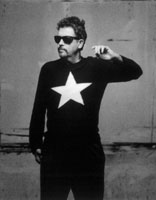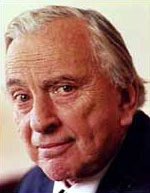The Love Parade, the Blues Festival, Webzine 2005, antiwar protests, and that remarkably sunny weather that creeps into San Francisco during this time of the year didn’t stop about 250 people from gathering at the All Saints Church to listen to Tom Robbins read from his newest book, Wild Ducks Flying Backwards — an event sponsored by the Booksmith. The crowd consisted mostly of people in their twenties and early thirties, with a few hoary-haired holdouts that had somehow kept their humor and idiosynchratic faith while flaunting sartorial garb from the L.L. Bean catalog: no mean feat by anyone’s standards.
 I had hoped to get Tom Robbins booked on the Bat Segundo Show, but while the people at Bantam were more than accommodating, it wasn’t in the cards. As Robbins himself explained to the crowd, he had recently had surgery in his right eye and had recently been the victim of “a Category 5 dental emergency.” This resulted in Robbins, at times, speaking out of the corner of his mouth. Robbins warned the audience that he “sounded like a cross between Gomer Pyle and Boy George.” Nevertheless, he still maintained the traces of his North Carolina drawl with a deadpan timbre, speaking at a measured pace and pausing to shout specific words into the mike for emphasis.
I had hoped to get Tom Robbins booked on the Bat Segundo Show, but while the people at Bantam were more than accommodating, it wasn’t in the cards. As Robbins himself explained to the crowd, he had recently had surgery in his right eye and had recently been the victim of “a Category 5 dental emergency.” This resulted in Robbins, at times, speaking out of the corner of his mouth. Robbins warned the audience that he “sounded like a cross between Gomer Pyle and Boy George.” Nevertheless, he still maintained the traces of his North Carolina drawl with a deadpan timbre, speaking at a measured pace and pausing to shout specific words into the mike for emphasis.
A few words on the new book: While the title shares the exuberance of Robbins’ previous tomes, this book collects short pieces that Robbins had racked up over the years. There are travel articles, “tributes” (more like over-the-top paeans, a few of them from 1967) to the likes of Ray Kroc, Nadja Salemo-Sonnenberg and redheads, an extremely mixed bag of “stories, poems and lyrics” (the less said about the poems, the better), “musings & critiques” and finally various responses to questions. In form, the book reminded me of Douglas Adams’ The Salmon of Doubt; the difference, of course, being that Robbins isn’t dead. While it’s a bit odd to experience Robbins in short form, causing one to reconfigure one’s head for unexpected ends (often after a mere paragraph), like The Salmon of Doubt, it’s still an interesting portal into Robbins’ thought processes. Just don’t pencil in the entire afternoon. You’re likely to knock this puppy off in a few hours.
Robbins was dressed in a grey suit that was slightly rumpled, although just crisp enough for a public appearance, and a black tee with the portrait of a cherubic green boy with crimson devil’s horns (the cultural connection momentarily eludes me). On his right hand, there was an extremely large and extremely round watch. He only took off his shades during the reading to reveal hounddog eyes surrounded by the deep circular recesses of age. But he kept the shades on during the Q&A session and, of course, during the mad rush of Robbinites stampeding towards the book signing line. He had dark tousled hair that appeared to have been cut by a barber in a rush. Near the back of his head, several sharp spikes emerged like blades of jet grass hankering for a head-shaped lawnmower.
Since we were in a church, Robbins started off by observing that his two grandfathers were Southern Baptists and that, because of this, he felt that it was his disposition to be in the pulpit. He said that he had spent some time in the Haight dring 1967 and remarked upon the many things to do in San Francisco. By comparison, Robbins noted that in his Northwestern town, there was little to do but throw a stick of margarine in the microwave and watch the oysters and clams come in from the fields.
He noted that despite San Francisco having “the highest cost of living in the solar system,” he was shocked that a bohemian culture still existed. This was, he thought, very conducive to art. And Robbins said that he had experienced a sudden burst of artistic activity. He had started writing a script entitled Pyrex of the Caribbean, which involved maintaining an oven-ready backing condition on the high seas. His offering for reality television was Fungi for the Straight Guy, whereby the producers would take a conservative Republican and give him a syphillitic mushroom with a camera crew following him around. And he had devised a pitch for a dramatic television show, Helen Keller: Private Eye with the tagline: “She’s blind, she’s deaf, she’s mute, but she can smell a rat a mile away.”
He read a piece first written in 1967, in which he had just seen the Doors. He read another piece from 1967 about the Seattle arts community. He read the Sonnenberg piece, as well as a travel piece called “Canyon of the Vaginas,” a story called “Moonlight Whoopie Cushion Sonata” and his response to the question “How do you feel about America?” in which the original response had been written in 1997 and updated with a footnote for the book. During the course of these readings, he would frequently stop midway, saying “And this goes on and on….”
Then there were questions. Robbins was asked what his favorite novel was. He said that Still-Life with Woodpecker was his favorite to write because it was so short. Half Asleep in Frog Pajamas, he found, “the structually most impressive.” Skinny Legs and All and Fierce Invalids Home from Hot Climates were “the ones I most admire,” although he said this with some uncertainty. Robbins doesn’t read his books after he’s written them. And this proved problematic when he had done several interviews in Italy. Unknowingly, Another Roadside Attraction had been republished. Unlike American journalists, Italian journalists actually read the book. So he was forced to respond to questions for a book he had not read in 25 years. He couldn’t obtain a copy of his own book, as the only ones available were in Italian.
An extremely obsessive Tom Robbins fan asked Robbins if Fierce Invalids from Hot Climates‘ Switters, seeing as how Switters appeared at the end of Villa Incognito, would be appearing in a future book. Robbins was clearly mystified by this and answered, “I haven’t been thinking about another book.” But he did mention that he was thinking of outsoucing the next book.
Robbins was asked which book he most admired this year. He said that he hadn’t been able to do much reading this year because of the eye. But he did say that the best books from the past 3-4 years were Louise Erdrich’s The Report on the Miracles at Little No Horse and Manil Suri’s The Death of Vichnu.
Questioned about his thoughts on the film version of Even Cowgirls Get the Blues, he said, “It was a big hit in Hungary.” He noted that Gus Van Sant was such a fan of the language that he had decided, against Robbins’ suggestions, to present the book’s dialogue as is. Robbins felt the film spiraled downward after the “first ten to twelve exhilirating minutes” and that, given the stylized nature of the language and that people don’t talk like this in real life, he felt it was a mistake that Van Sant had made that decision. Particularly since the first words were said by an actress who had never acted before. “Not a lot of authors will tell you that,” he said, mentioning that most novelists want to retain the original feel of a book.
Robbins doesn’t base any of his characters on real people, save Jitterbug Perfume‘s Dannyboy, who was “50% Timothy Leary.” However, the aforementioned Switters was based in part on a CIA agent Robbins had met in Singapore. Despite being a member of one of the most evil agencies in the world and despite desiring to be posted in Southeast Asia so that he could have sex with underage girls, Robbins remarked that this agent was articulate, well-educated, charming, funny, and the kind of guy who would risk his life for you. It demonstrated to Robbins that human beings were more complex than we give them credit for. Thus, Switters was born.
There was another minor character who Robbins had based on a real person — a yuppie he knew in “one of those books.” Apparently, a note from the editor came back, indicating that this one character didn’t seem real and was “too artificial.” But in this instance, Robbins had essentially taken the details from ordinary life.
Asked about Finnegans Wake, Robbins again insisted that he was stuck on page 49 and that he understands it all. He said that it was “the most realistic novel ever written” and said that it was almost impossible to be real in fiction.
Once, Robbins was on a panel with John Irving. And Irving had remarked that he could never write a book until he knew the end. Robbins couldn’t believe this and said, “Isn’t that like working in a factory?”
Since this is San Francisco, there was one question asked about what Robbins’ stance was on polyamory. Robbins genuinely did not know what this was. He confused it with polygamy. After an explanation, Robbins said, “I had some experience with that. I tell ya, it only can lead to disaster.”

 But he?s also a lively conversationalist and a true raconteur. His comments were leavened with humor: ?These guys [Bush and Cheney] have turned me into creationists?Darwin was wrong!? And of course, it?s hard to imagine anyone else who knows so much about US history. His faculties remain undiminished by the fact he?ll turn 80 this year or that he now walks haltingly with the aid of a cane (he recently had knee surgery). He speaks in a deep baritone and, while regaling the packed house with his inexhaustible supply of anecdotes, treated us to spot-on imitations of JFK, Eleanor Roosevelt, FDR, Orson Welles and W (natch).
But he?s also a lively conversationalist and a true raconteur. His comments were leavened with humor: ?These guys [Bush and Cheney] have turned me into creationists?Darwin was wrong!? And of course, it?s hard to imagine anyone else who knows so much about US history. His faculties remain undiminished by the fact he?ll turn 80 this year or that he now walks haltingly with the aid of a cane (he recently had knee surgery). He speaks in a deep baritone and, while regaling the packed house with his inexhaustible supply of anecdotes, treated us to spot-on imitations of JFK, Eleanor Roosevelt, FDR, Orson Welles and W (natch).